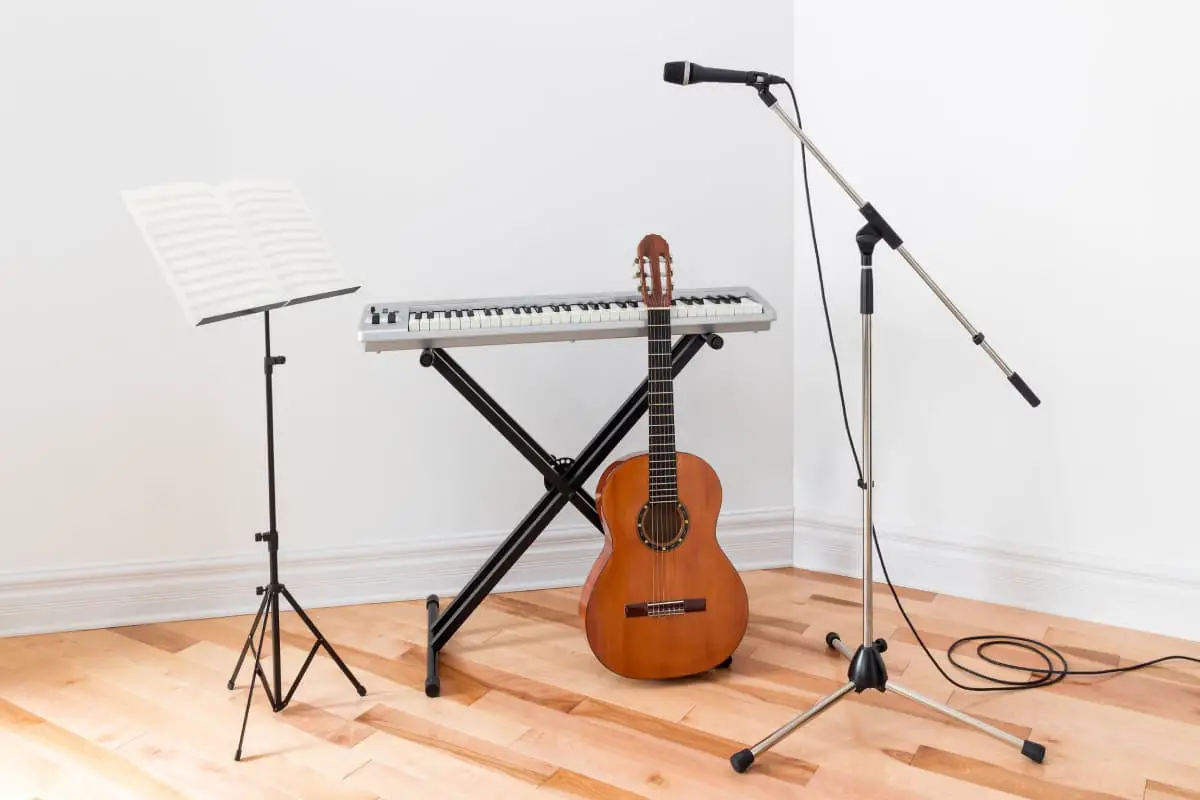Guitar and piano sound excellent together. Both instruments are capable of producing gorgeous sounds, and when paired together, they can take your music to a whole other level. However, how do you make these instruments play side by side without creating a cacophony?
Here are 11 tips for playing the guitar and piano together:
- Do not play the way you would alone.
- Tune the guitar to the piano.
- Understand each other’s chords.
- Have the piano “carve out” a range for the guitar.
- Play at different rhythms.
- Know that neither needs to be the sole accompaniment.
- Do not be afraid to take the solo.
- Communicate about sound.
- Listen to another guitar/piano duet.
- Do not be scared to start over.
- Practice together, not apart.
In the rest of the article, I’ll take you through each of these tips in hopes of helping you better understand how to arrange a stellar guitar-piano duet. You’d be surprised how much freedom and creativity you’ll find in your music when you play by the rules.
👇😀👇NOTE👇😀👇
If you want to find out what my recommended guitar gear is, then here is what I recommend on Amazon:
- Fender Cutaway Acoustic-Electric Guitar Bundle (MY FAVORITE GUITAR)
- Snark SN-8 Super Tight All Instrument Tuner (Easiest Tuner I’ve Used😏)
- 6 String Acoustic Guitar Capo (Best CAPO for quick changes)
- Dunlop Max Grip 1.0mm Nylon Picks (Thick Guitar Pick So You Don’t Lose Grip!)
- Universal Guitar Stand (Cheap & Minimalist Guitar Stand I Recommend)
- Levy’s 2″ Wide Quick Adjust Guitar Strap (Best Guitar Strap For Any Level)
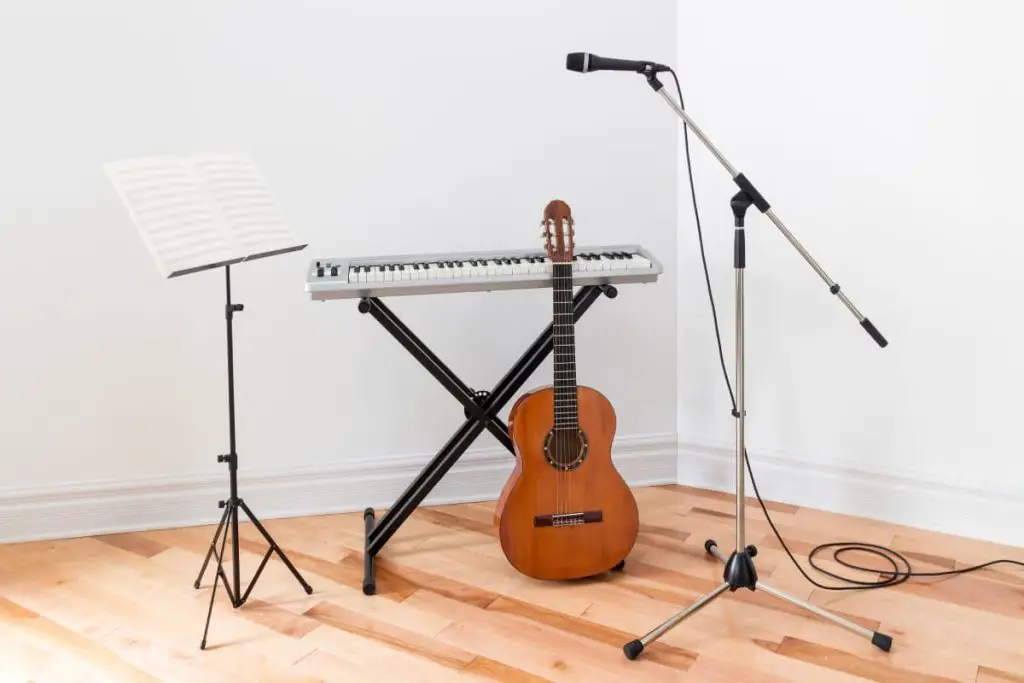
1. Do Not Play the Way You Would Alone
As soon as you sit down with your instrument, you’re going to want to play like you do when you’re alone. However, with piano and guitar, it is not going to be that simple. Neither instrument ought to play as if it were solo – both musicians need to listen to one another and respond as needed moment by moment.
Jazz players have a saying: serve the music and not yourself. This motto has to be your mindset going into a piano and guitar duet (or any duet, for that matter). Since both instruments rely on chords, you will need to adjust your style and probably your frequency as well. I’ll talk in more detail about this later, and it is perfectly fine if it takes the two of you a while to feel how your instruments can work together and adjust accordingly.
This is a skill you won’t be able to develop simply by doing some research or reading a book; so get practicing and tweak as necessary.
2. Tune the Guitar to the Piano
If you have an older piano, it may be in tune with itself, but not the rest of the world. An out-of-tune piano does not mean your piano is unfit to play with other instruments, just that the other instruments will have to accommodate for its shortcomings! When playing guitar and piano together, the guitar should be the one to cater to the piano’s tuning as a piano is much harder to adjust.
Have the piano play the guitarist’s desired notes and let the guitar sharpen or flatten the tuning to fit the piano (Related: are classical guitars tuned differently). Tuning your guitar perfectly definitely follows a bit of a learning curve, so be patient with yourself and the other player. The whole tuning process may initially set your teeth on edge, but trust me, it will be far worse if the two tones do not match!
NOTE: If you have a keyboard, you can, of course, skip this painful step. Your biggest hurdle will be making sure the keyboard has the perfect volume so it does not fall into oblivion but also doesn’t drown out the guitar. However, this part is best left up to your and your partner to navigate. And don’t worry – the rest of the article’s tips still apply to you, so read on!
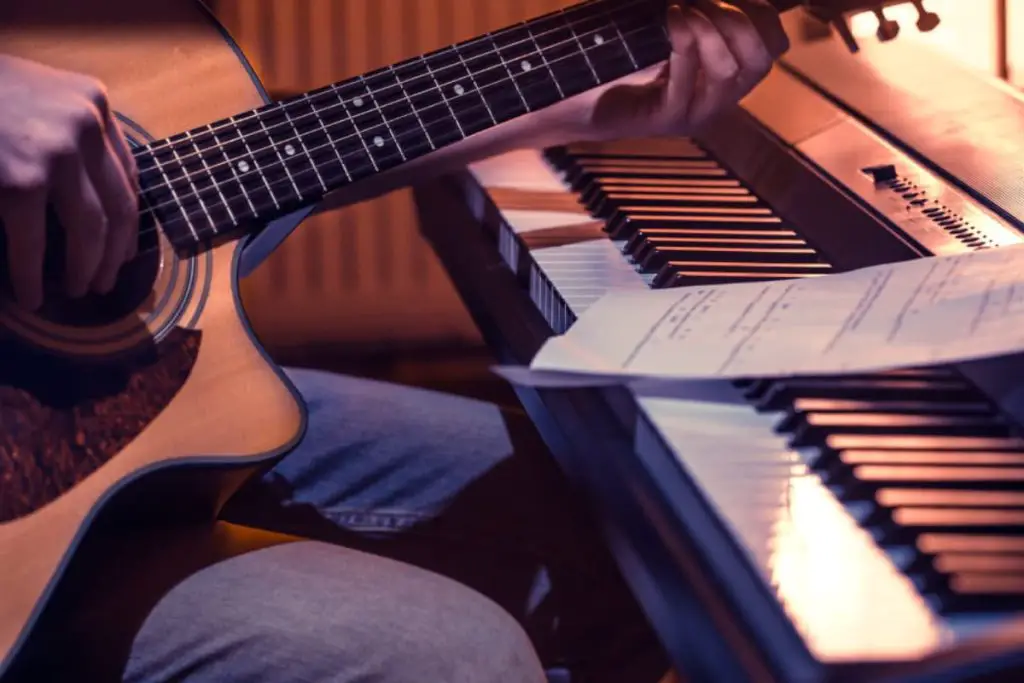
3. Understand Each Other’s Chords
If either the guitarist or the pianist has played the other instrument in the past, the process will be significantly simpler to navigate. However, for a beginner guitarist or pianist, the chords of the other instrument may not make as much sense. It is essential to be on the same page before you start playing so that neither of you is astounded or confused by clashing sounds.
If you tell a pianist to play a G major chord, they will likely play the triad G B D with both hands. Tell a guitarist to play a G major chord, and they will ask which one. Since a guitar has six strings, there are far more ways to play a G major chord – you could have three Gs, two Bs, and no Ds. This difference in chords is why it is essential to talk with your partner about which notes they’re planning to play so that the piano can adjust and change the sound if necessary.
Ideally, the piano should play the same notes as the guitar and not just stick to the piano chords with which they are most familiar. Sticking to guitar-like chords does not mean the piano should only play the guitar’s chords, it just means that the pianist should have their hands hovering over the notes the guitar is planning to play.
The pianist can always have fun with the sound and harmony and create unique variations as they wish, just as long as they hear what the guitar is doing and adapt accordingly.
4. Have the Piano “Carve-Out” a Range for the Guitar
Now, as vital as it is to know the notes your partner is playing and try to remain on the same page, playing the same exact notes in the same octave can actually end up causing a bit of a clash. The two of you will unnecessarily compete for space and sound, and it will not be the musical experience you want.
Instead of playing in the same frequency, have the pianist play above or below the chosen octave of the guitar. This way, both instruments will be heard, and there is less chance of an uncomely cacophony of notes. Utilizing the full range of both instruments means you don’t have to waste piano space where the guitar can reach. Use the piano to play where the guitar cannot, and let the guitar play where it is comfortable!
Feel free to play around with this as well. The piano can start in the lower octaves and then jump higher, or your guitar can begin in the middle and jump high while the piano goes low. Whatever you do, just be cognizant of your partner – if they try something experimental, just go with it.
Not only will this approach allow both your talents to shine, but it will also end up producing a smoother, much more pleasant sound.
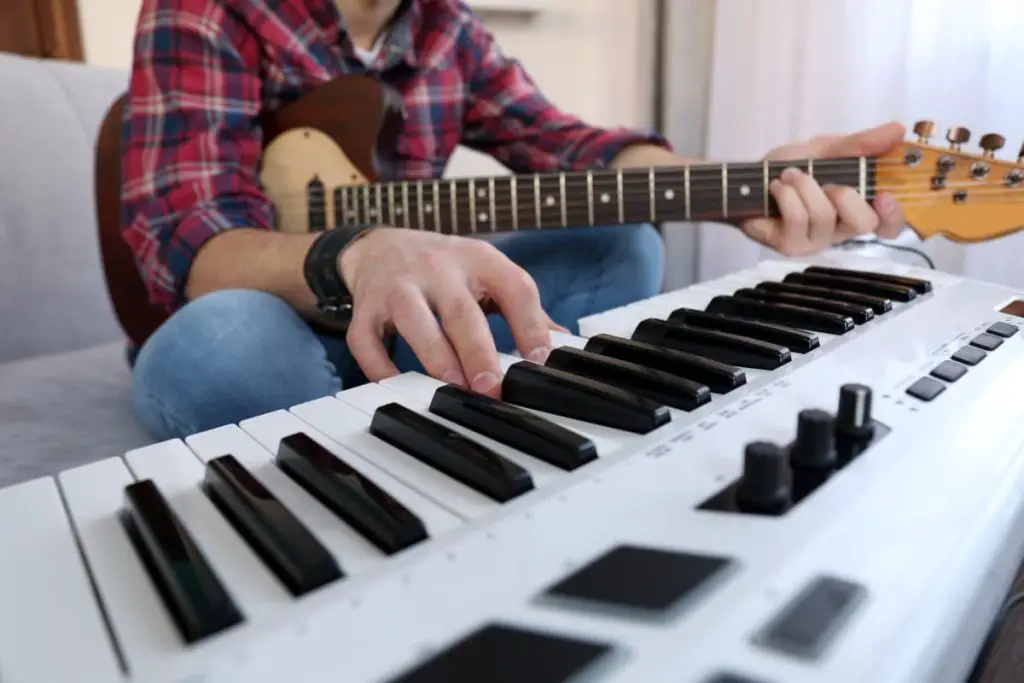
5. Play at Different Rhythms
To further differentiate the sound of the guitar and the piano, it is best to play at different rhythms. Playing at the same tempo may be appealing at first, but the notes themselves will quickly become lost in the beat, and you won’t be making music anymore; you’ll just have a string of chords.
If your guitarist is strumming eighth notes, the piano should step in and play quarters, halves, or sixteenths – anything but eighths. In fact, you should probably do a mixture of different length notes to avoid a pounding beat that drowns out everything else. This mixture will balance out the overall sound and ensure that the music is neither too busy nor too dull. As always, it is crucial to listen to what your partner is doing and accommodate the best you can.
If your guitarist knows more advanced strumming rhythms, the pianist may need to play slowly. To truly enjoy an exciting rhythm, you have to be given space. In this case, the pianist should do their best to play a predictable and mellow rhythm that can fade into the background and provide a sound stage for the guitar’s melody.
6. Know That Neither Needs To Be the Sole Accompaniment
The thing about guitar and piano is that neither is forced to be the sole accompaniment to the other. Both pianists and guitarists should be used to both taking center stage and providing support to other instrumentalists. Do not feel like your instrument will always be the accessory to your partner.
The matter of accompaniment is precisely the type of thing that needs to be communicated about, player to player before you even start and as you go along. I’lll say this many times, but good communication is the source of good music. You could both be great musicians, but you will not sound great together if you have no respect for the other’s ability.
If you have a song you would like to play together, but it is made for only one of your instruments, take time to experiment with the melody. Just because the song is written for guitar does not mean the piano cannot rock it! Letting the accompanying instrument have a chance at the melody will make them produce higher-quality sounds in the end, as they will get the feel of the song and its rhythm better than if they had to play it by themselves.
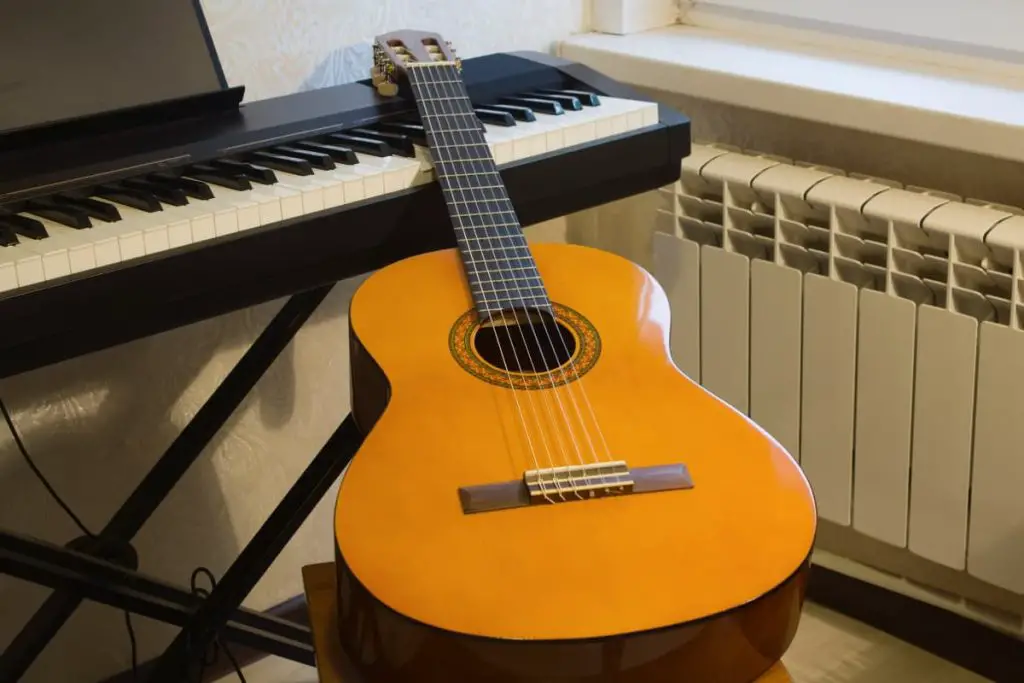
7. Do Not Be Afraid To Take the Solo
This tip closely relates to the last tip I shared, but with a significant difference: the matter of your own confidence. Beyond all doubt, both pianos and guitars can play inspiring solos. The only thing standing between you and a good instrument solo moment is nervousness.
It can be intimidating to go out on a limb in front of a friend or acquaintance. But if you do not take initiative when you feel a great tune coming, you are going to end up cheating yourself and your partner. Let the music lead you to take chances and let your friend join in for the ride. If you both have this mindset about solos, you have a good chance of discovering some beautiful tunes.
8. Communicate About Sound
As mentioned before, communication may be the most critical part of playing with a partner. If you do not speak to each other about the sounds you like and want to hear more of and what you do not enjoy, your music will not please either of you.
After every session, you should talk with your friend about what you think went well and what you think needs improving or altering. Your friend may have a different idea of where they want the music to go, and it’s always good to know that as soon as possible. As long as you’re talking, you’re making progress!
9. Listen to Another Guitar/Piano Duet
Whenever you feel at a loss as to where the music is going or what your next step is, you ought to look up piano/guitar duets on YouTube and listen to them with your partner. Listening to other musicians play the music you’re trying to play is an excellent way to get out of your own ruts and learn from people with more experience.
Take careful note of the player of your instrument and tell your partner to do the same. Slow down the video if you need, and even write down your observations. Think about the differences and similarities between your playing and their playing, and try to copy what you think they do better.
It does not have to be an instruction video for you to learn from it; in fact, it’s better if it’s not. Just listening to other people play the guitar and piano together will train your ear to spot what is right and what isn’t. If you can find a video of someone playing your exact song, all the better.
NOTE: Do not discourage yourself by listening to a musical duet far beyond your own skill level. If you are a beginner, search videos for beginners or intermediates. Once you master the basics and are ready to improve, then you can start listening to more complicated pieces. However, if you listen to difficult music right off the bat, you’re going to become disenchanted regarding your own talent.

10. Do Not Be Afraid To Start Over
Starting over is something you should be used to as a musician, so do not be discouraged when you have to do it a lot. If your partner is struggling in the middle of the song and you are not, just call a start over and let them play what they’re already good at before moving on to the more difficult parts.
Repeating a section that either of you has difficulty with is a sure way to cement the part in your head, but do not neglect the rest of the song thinking you have it down pat. The song you make yourselves or adapt for piano and guitar must be thought of as a whole, so play it through as a whole as many times as you can when you are comfortable.
If you’re playing a long song, playing through the whole thing can be a time commitment. Be sure to take breaks and intermissions when necessary. After fifteen minutes of playing, you should stop briefly to walk around, talk with your partner, and maybe eat a snack. This pause will ultimately keep your brain in the game by preventing it from becoming overtired.
An overtired mind is not going to play music accurately, and you do not want to practice the song incorrectly.
11. Practice Together, Not Apart
Practicing the song without your partner may seem tempting, but it should be done as little as possible. If you want the song to be a duet, you should strive to always play it as such. Playing the song on your own can lead to bad habits that you would not notice unless the other instrument is present. Playing together will ensure that you both improve at the same rate and are always aware of the needs of the other.
If you do decide to practice apart from your partner, at least keep them informed about what you practiced and when. You can even record your practice session and send it to them in case they want to practice playing along.
The last thing you want is for one musician to be more engaged and more practiced than the other without communicating about it. This can lead to a feeling of superiority and frustration with your friend that will not serve your friendship or the music you want to make.
If one partner has a lot more free time than the other, you will have to get creative or put intentional limits on the partner with more free time. Whatever you do, do not shame your partner for not having as much time to dedicate to practice as you do. This is a very easily avoided point of contention – you must learn to extend grace and not be caught up in selfish desires.
Fighting with your partner, or worse, quietly resenting them, will break apart your friendship. If you genuinely cannot play with them because they cannot make the time, you might have to think about getting a new partner with similar goals and time to spare.
The piano and the guitar are both beautiful, stand-alone instruments: combining them is not only special but exhilarating. Once you get the hang of it, you’re not going to want to stop!
👇😀👇NOTE👇😀👇
If you want to find out what my recommended guitar gear is, then here is what I recommend on Amazon:
- Fender Cutaway Acoustic-Electric Guitar Bundle (MY FAVORITE GUITAR)
- Snark SN-8 Super Tight All Instrument Tuner (Easiest Tuner I’ve Used😏)
- 6 String Acoustic Guitar Capo (Best CAPO for quick changes)
- Dunlop Max Grip 1.0mm Nylon Picks (Thick Guitar Pick So You Don’t Lose Grip!)
- Universal Guitar Stand (Cheap & Minimalist Guitar Stand I Recommend)
- Levy’s 2″ Wide Quick Adjust Guitar Strap (Best Guitar Strap For Any Level)
Related Posts:
- 10 Subtle Signs Your Guitar Action Is Too High
- 10 Best Things To Do With an Older Acoustic Guitar
- 4 Ways To Keep a Guitar From Getting Dusty
- 5 Major Differences Between a Guitar and a Violin
- 6 Reasons Why Your Acoustic Guitar Strings Buzz
- Guitar Tuner Not Working? Common Causes and Fixes
- 25 Best Guitar Tips for Beginners (Play Guitar, Learn Guitar, Acoustic, Electric)

